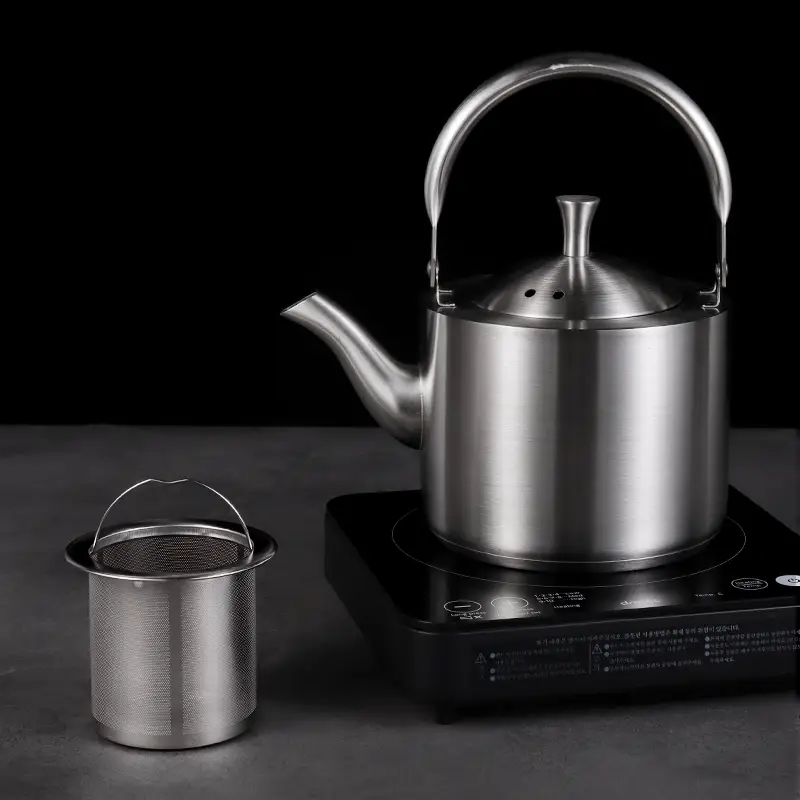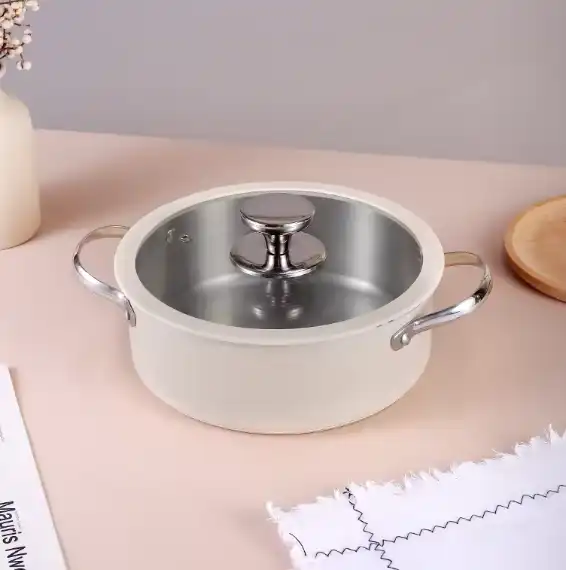¿Cuál es mejor, la batería de cocina de acero inoxidable o la antiadherente? De hecho, cada una tiene sus propias ventajas. Cuál es mejor para usted depende de sus hábitos de uso, métodos de cocción, etc. Por supuesto, si la seguridad y la salud son sus consideraciones más importantes, la batería de cocina de acero inoxidable será la mejor elección.
A continuación presentaré los utensilios de cocina de acero inoxidable y los antiadherentes desde el punto de vista de la seguridad, las características respectivas, los escenarios de aplicación, etc.
Acerca de los utensilios de cocina antiadherentes
La mayoría de los utensilios de cocina antiadherentes del mercado están recubiertos de teflón. Cabe señalar que el teflón en sí no es tóxico y puede utilizarse durante mucho tiempo por debajo de 260°C. Las baterías de cocina antiadherentes de teflón son seguras si se utilizan con las especificaciones correctas. Pero, de hecho, es difícil que la gente lo haga. Es necesario prestar atención para evitar que cualquier objeto afilado, como palas, lana de acero, espinas de pescado, espinas de pollo, etc. raye el revestimiento de teflón de la batería de cocina antiadherente. Un revestimiento agrietado hará que los alimentos se peguen fácilmente a la sartén antiadherente y se quemen, y producirá sustancias nocivas como hidrocarburos aromáticos policíclicos, que aumentarán el riesgo de cáncer de pulmón y cáncer nasofaríngeo. También existe el riesgo de disolución del aluminio.
Cuando descubra que el revestimiento de sus utensilios de cocina antiadherentes se ha desprendido, provocando que los alimentos se quemen con facilidad, lo mejor es sustituirlos por otros nuevos a tiempo.
En circunstancias normales, la vida útil de una batería de cocina antiadherente es de 1-2 años, pero cuando su antiadherencia desaparece, aunque el revestimiento no esté dañado, debe sustituirse a tiempo por una nueva.
Diferentes tipos de utensilios de cocina antiadherentes
Es posible que haya visto muchos tipos de sartenes antiadherentes, como la sartén antiadherente de piedra médica, la sartén antiadherente de panal, la sartén antiadherente de diamante y la sartén antiadherente de cristal de titanio. Estas sartenes antiadherentes utilizan esencialmente un revestimiento de teflón para evitar que los alimentos se peguen a la sartén.
¿Qué es una olla médica de piedra?
¿Son las sartenes antiadherentes de piedra médica realmente de piedra médica? Por supuesto que no. La piedra médica es un mineral de roca volcánica y no puede utilizarse para fabricar sartenes. El revestimiento antiadherente de su superficie sigue siendo teflón. "Sartén de piedra médica" sólo convierte la textura del revestimiento en un dibujo de piedra médica. Las sartenes antiadherentes de piedra médica proceden originalmente de Corea, y este diseño es más bien un método de marketing.
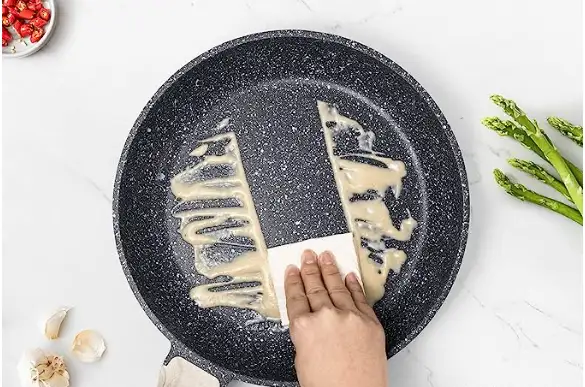
Sartén antiadherente Honeycomb
Como ya se ha mencionado, la principal razón que afecta a la experiencia de uso de las sartenes antiadherentes es que el revestimiento es fácil de despegar, por lo que los usuarios deben prestar más atención al utilizarlas. La sartén antiadherente de panal tiene más mejoras y actualizaciones basadas en el revestimiento de teflón. Blinda el revestimiento y lo protege de arañazos.
Entonces, ¿es segura la sartén de acero inoxidable de nido de abeja?
Por supuesto, en comparación con las sartenes antiadherentes de acero inoxidable con revestimiento normales, su resistencia a los arañazos la hace mucho más segura. No hay que prestar mucha atención al usarla, incluso se puede utilizar una pala. Conserva las propiedades antiadherentes y aporta una experiencia cómoda a la vida de las personas, además de ser más segura y saludable.
La sartén antiadherente de nido de abeja producida por Fabricante de menaje de cocina PURECOOK tiene las ventajas de la sartén antiadherente tradicional, a la vez que es duradera y fácil de usar. Invitamos a los compradores B2B a ponerse en contacto con nosotros para obtener solución de batería de cocina a medida.
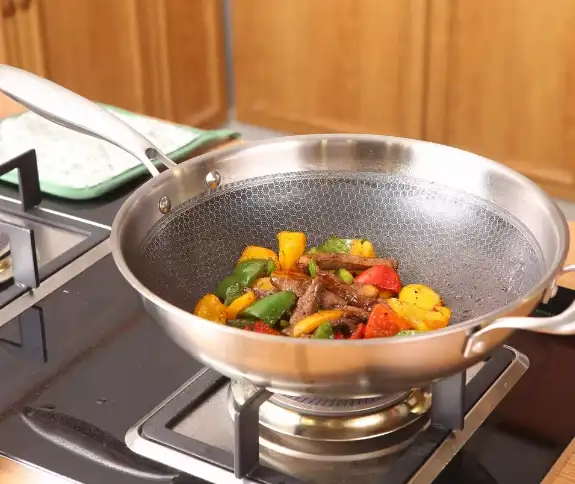
Sartén antiadherente de diamante y sartén antiadherente de cristal de titanio
Este tipo de sartén antiadherente se fabrica añadiendo algunas partículas metálicas de diamante o titanio al revestimiento de teflón, para que el revestimiento sea más resistente al desgaste y más fuerte, lo que puede prolongar la vida útil de la sartén hasta cierto punto. Su precio también es mucho más elevado que el de las sartenes de acero inoxidable.
Acerca de los utensilios de cocina de acero inoxidable
La mayoría de los fabricantes de marcas conocidas utilizan acero inoxidable de calidad alimentaria. El acero inoxidable de alta calidad es resistente a los ácidos, a la sal y a la corrosión. No libera metales pesados ni otras sustancias nocivas tras un uso prolongado.
El acero inoxidable es fuerte y duradero, pero no tiene revestimiento, por lo que no tiene que preocuparse de que la sartén se raye. Y lo que es más importante, los materiales de acero inoxidable no reaccionan químicamente con los alimentos, no cambian su sabor ni su textura y pueden mantener el sabor original de la comida. Los utensilios de cocina de acero inoxidable suelen tener una buena conductividad térmica, lo que permite calentar los alimentos de manera uniforme y conservar su sabor.
Como es duradera, no se oxida y está fabricada con materiales sanos, la batería de cocina de acero inoxidable aguanta bien guisar, hervir, saltear o freír.
Fabricante de menaje de cocina PURECOOK provice venta al por mayor utensilios de cocina de acero inoxidableBienvenido a compradores B2B de todo el mundo para comprar utensilios de cocina.
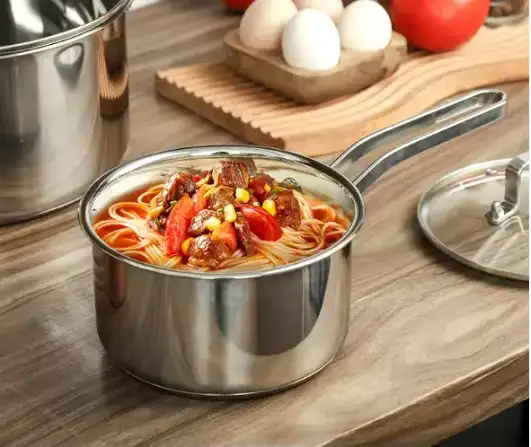
¿Son antiadherentes las sartenes de acero inoxidable?
Algunas personas lo utilizan para cocinar, y mucha comida se pega a la olla; pero hay quien dice que no se pega en absoluto.
¿Cuál es la verdad?
De hecho, en la mayoría de los casos, el acero inoxidable es antiadherente, pero en algunos casos, las ollas de acero inoxidable pueden ser antiadherentes.
Cómo hacer que el acero inoxidable sea antiadherente?
En realidad, requiere un poco de habilidad culinaria.
Las sartenes de acero inoxidable son antiadherentes a una temperatura constante de 160-180°C. Al cocinar, hay que mantener la sartén caliente antes de verter el aceite. Los pasos concretos son: caliente una sartén de acero inoxidable a fuego medio-bajo. Cuando note que la temperatura de la sartén sube, ponga una gota de agua en la sartén de acero inoxidable. Si el agua cae y se convierte en una pequeña bola que rueda en la sartén sin deshacerse, podemos confirmar que la temperatura de la sartén es la adecuada. En este momento, puede verter aceite para cocinar, lo que puede lograr el efecto antiadherente.
¿Qué tipo de espátula debemos utilizar para un wok de acero inoxidable?
El acero inoxidable es resistente a los arañazos y al desgaste, por lo que básicamente se pueden utilizar todo tipo de espátulas. No hay ningún problema en utilizar una espátula de acero inoxidable. Sin embargo, como la superficie de wok de acero inoxidable es muy lisa, la espátula de acero inoxidable dejará inevitablemente pequeños arañazos. Utilice una espátula de madera o de silicona para proteger el cuerpo del wok y aumentar su vida útil.
Fabricante de menaje de cocina PURECOOK productos y venta al por mayor wok de acero inoxidable de alta calidads.Welcome kitchenware B2B compradores de todo el mundo a comprar en línea.
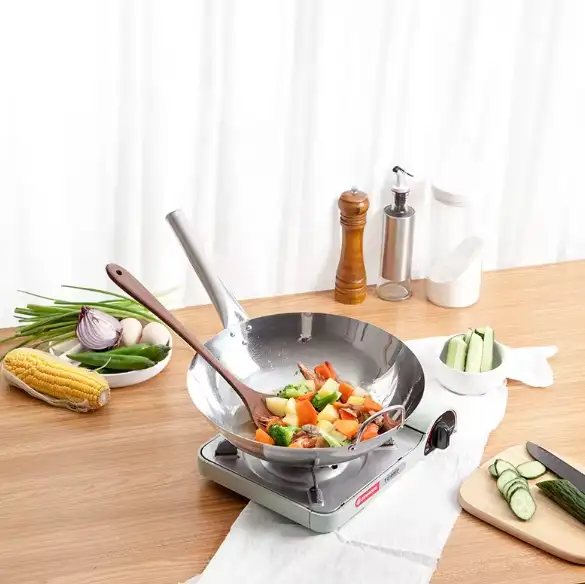
¿Se pueden utilizar baterías de cocina de acero inoxidable en placas de inducción?
La mayoría de las baterías de cocina de acero inoxidable pueden utilizarse en placas de inducción. Las baterías de cocina de acero inoxidable utilizadas en las placas de inducción deben cumplir una condición, a saber, que el material de la batería de cocina sea magnético. En cuanto a este punto, antes de comprar, tenemos que averiguar con el vendedor si el producto es universal para cocinas de gas y cocinas de inducción.
Algunos utensilios de cocina de acero inoxidable con escasa conductividad magnética tienen una eficiencia de calentamiento lenta y no pueden utilizarse como cocina de inducción cualificada.
Las ollas de acero inoxidable también pueden utilizarse en cocinas de gas, pero hay que tener en cuenta que algunas ollas especialmente finas pueden quemarse rápidamente si se calientan directamente. Por lo tanto, a la hora de elegir una batería de cocina de acero inoxidable, lo mejor es optar por una con un diseño de fondo compuesto y un cuerpo de olla relativamente grueso.
PURECOOK Fabricante de utensilios de cocina produce productos de alta calidad batería de cocina de acero inoxidable con fondo de material compuestoSomos uno de los mejores proveedores de utensilios de cocina y su elección digna de confianza.
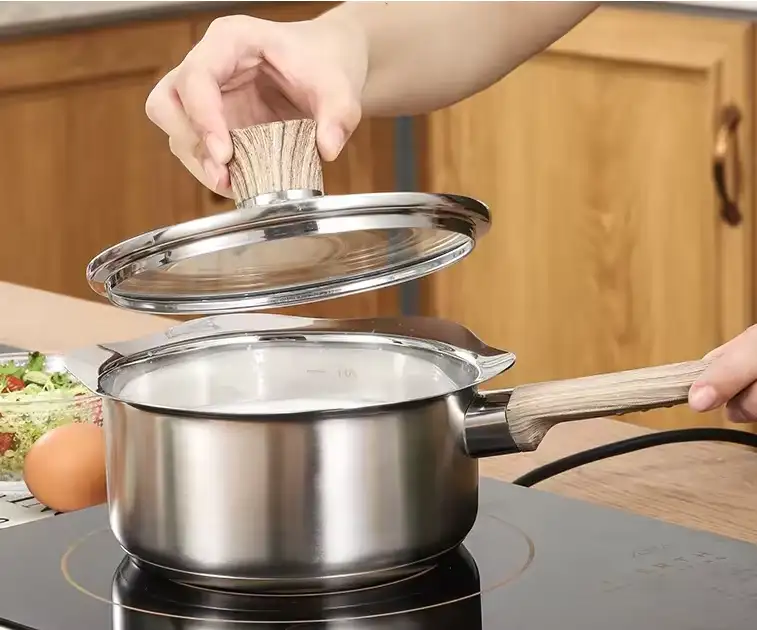
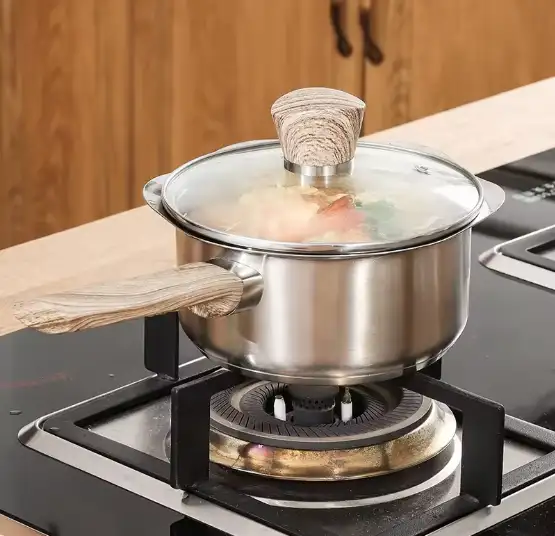
Precauciones de uso de la sartén antiadherente:
Evitar la combustión prolongada en seco
Ya se trate de una sartén antiadherente ordinaria, una sartén antiadherente de piedra médica o una sartén antiadherente de panal, debe evitar que se queme en seco o en vacío durante mucho tiempo.
Si una sartén antiadherente se deja desatendida a altas temperaturas durante mucho tiempo, es probable que se produzcan daños en su estructura y rendimiento. El sobrecalentamiento de la sartén puede provocar su deformación y la descamación del revestimiento. No sólo es difícil de reparar, sino que puede ser necesario sustituirla con antelación.
Evite lavar la batería de cocina con agua fría inmediatamente cuando la temperatura sea alta.
Cuando la sartén antiadherente acabe de cocinarse, especialmente después de una cocción a alta temperatura, no la enjuague inmediatamente bajo el chorro de agua fría, ya que la temperatura de la sartén es extremadamente alta en ese momento, mientras que la temperatura del agua fría es baja. Los cambios bruscos de temperatura pueden dañar el revestimiento, afectando al efecto de uso y a la vida útil de la sartén antiadherente.
Puede utilizar agua caliente para limpiar la superficie de la sartén. El agua caliente no sólo facilita la limpieza de la sartén, sino que la diferencia de temperatura no será demasiado grande. También puede evitar daños en el revestimiento debido a los cambios de temperatura.
O espere a que el cuerpo de la olla se enfríe y luego límpielo con agua fría para evitar daños en el revestimiento debidos a los cambios de temperatura.
En resumen, los métodos de limpieza correctos pueden mantener el rendimiento y el aspecto de las sartenes antiadherentes, lo que garantiza que la vida útil y el rendimiento de las sartenes antiadherentes sean máximos.
No utilice nunca estropajos de acero para limpiar
Si se queman alimentos durante la cocción y queda una pequeña cantidad en la superficie de la olla, no se puede utilizar estropajo de acero para limpiarla, ya que se destruiría el revestimiento de la superficie.
Si queda demasiado aceite en la olla después de cocinar, puedes limpiarlo primero con un paño de cocina y luego con una esponja que no dañe la superficie de la olla.
Si queda demasiado aceite en la sartén después de cocinar, puedes limpiarlo primero con un paño de cocina y luego con una esponja que no dañe la superficie de la sartén.
Si le resulta difícil limpiarla, déjela en remojo en agua templada durante un rato y la mancha se desprenderá de forma natural.
Utilice una espátula adecuada
Procure no utilizar espátulas duras de acero inoxidable, ni siquiera para las sartenes antiadherentes más nuevas, como las sartenes antiadherentes de panal y las sartenes antiadherentes de diamante. Una espátula dura puede dañar el revestimiento de la superficie antiadherente. Las sartenes antiadherentes con revestimiento regular son más susceptibles de dañarse. Cuando cocine con una sartén antiadherente, debe utilizar una espátula de corcho o una espátula de silicona, que no dañarán la sartén ni harán ruidos fuertes.
Almacenar en seco
Las sartenes antiadherentes deben lavarse inmediatamente después de su uso. No deje que la suciedad permanezca en la sartén durante mucho tiempo. Deben colocarse en seco después de limpiarlas.
No guarde salsa de soja, sal, vinagre y otros materiales durante mucho tiempo para evitar la corrosión del cuerpo de la olla.
Sustituir a tiempo
Por lo general, la vida útil de las sartenes antiadherentes es de unos dos años. Después de dos años de uso, hay que cambiarla a tiempo. Si después de usar la sartén antiadherente durante mucho tiempo, el fondo se raya, el color se vuelve opaco o la sartén se pega, debe dejar de usarla y sustituirla a tiempo.
Precauciones de uso de las ollas de acero inoxidable
Evitar el calentamiento prolongado
Aunque las ollas de acero inoxidable son resistentes y duraderas, el calentamiento prolongado a alta temperatura puede causarles ciertos daños. Por lo tanto, durante el proceso de cocción, debemos elegir el calor y el tiempo adecuados en función de las necesidades reales para evitar mantener la olla en un estado de alta temperatura durante mucho tiempo.
Limpiar a tiempo
La limpieza a tiempo también es clave para mantener las ollas de acero inoxidable. Después de cocinar, debemos limpiar rápidamente los restos de comida y las manchas de aceite de la olla. Se recomienda utilizar un trapo suave y detergente neutro para la limpieza, y evitar usar objetos duros o utensilios de cocina afilados para arañar la superficie de la olla.
Resuma
En resumen, las sartenes antiadherentes y las sartenes de acero inoxidable tienen cada una sus propias ventajas. A la hora de elegir, puede sopesarlas en función de sus necesidades culinarias personales y sus hábitos de uso. Y lo que es más importante, utilice utensilios de cocina de fabricantes conocidos. La calidad de estos utensilios suele estar más garantizada y le permitirán utilizarlos con más confianza.

